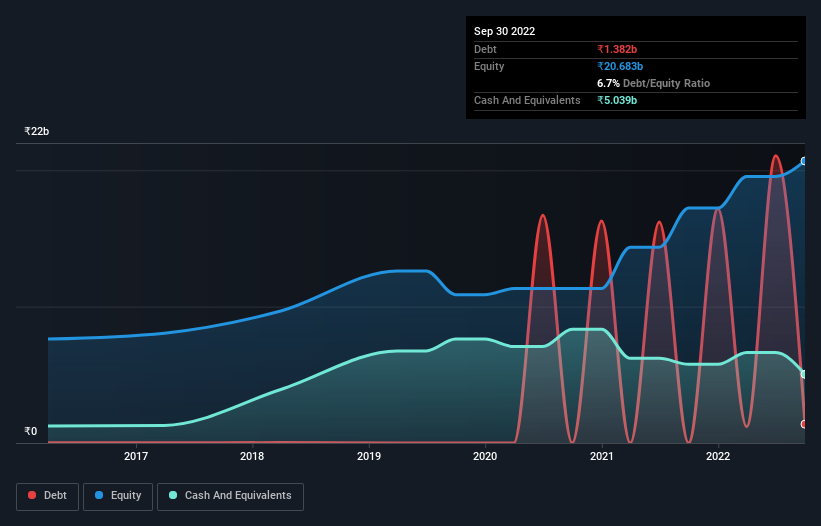
Some say volatility, rather than debt, is the best way to think about risk as an investor, but Warren Buffett famously said that 'Volatility is far from synonymous with risk.' So it might be obvious that you need to consider debt, when you think about how risky any given stock is, because too much debt can sink a company. Importantly, Jubilant FoodWorks Limited (NSE:JUBLFOOD) does carry debt. But is this debt a concern to shareholders?
What Risk Does Debt Bring?
Debt assists a business until the business has trouble paying it off, either with new capital or with free cash flow. In the worst case scenario, a company can go bankrupt if it cannot pay its creditors. However, a more common (but still painful) scenario is that it has to raise new equity capital at a low price, thus permanently diluting shareholders. Of course, the upside of debt is that it often represents cheap capital, especially when it replaces dilution in a company with the ability to reinvest at high rates of return. The first thing to do when considering how much debt a business uses is to look at its cash and debt together.
Our analysis indicates that JUBLFOOD is potentially overvalued!
What Is Jubilant FoodWorks's Debt?
As you can see below, at the end of September 2022, Jubilant FoodWorks had ₹1.38b of debt, up from none a year ago. Click the image for more detail. However, its balance sheet shows it holds ₹5.04b in cash, so it actually has ₹3.66b net cash.

How Healthy Is Jubilant FoodWorks' Balance Sheet?
We can see from the most recent balance sheet that Jubilant FoodWorks had liabilities of ₹10.0b falling due within a year, and liabilities of ₹21.1b due beyond that. On the other hand, it had cash of ₹5.04b and ₹275.5m worth of receivables due within a year. So its liabilities outweigh the sum of its cash and (near-term) receivables by ₹25.8b.
Since publicly traded Jubilant FoodWorks shares are worth a total of ₹360.7b, it seems unlikely that this level of liabilities would be a major threat. But there are sufficient liabilities that we would certainly recommend shareholders continue to monitor the balance sheet, going forward. While it does have liabilities worth noting, Jubilant FoodWorks also has more cash than debt, so we're pretty confident it can manage its debt safely.
One way Jubilant FoodWorks could vanquish its debt would be if it stops borrowing more but continues to grow EBIT at around 17%, as it did over the last year. When analysing debt levels, the balance sheet is the obvious place to start. But ultimately the future profitability of the business will decide if Jubilant FoodWorks can strengthen its balance sheet over time. So if you're focused on the future you can check out this free report showing analyst profit forecasts.
Finally, a business needs free cash flow to pay off debt; accounting profits just don't cut it. Jubilant FoodWorks may have net cash on the balance sheet, but it is still interesting to look at how well the business converts its earnings before interest and tax (EBIT) to free cash flow, because that will influence both its need for, and its capacity to manage debt. During the last three years, Jubilant FoodWorks generated free cash flow amounting to a very robust 85% of its EBIT, more than we'd expect. That positions it well to pay down debt if desirable to do so.
Summing Up
While it is always sensible to look at a company's total liabilities, it is very reassuring that Jubilant FoodWorks has ₹3.66b in net cash. The cherry on top was that in converted 85% of that EBIT to free cash flow, bringing in ₹5.0b. So we don't think Jubilant FoodWorks's use of debt is risky. Over time, share prices tend to follow earnings per share, so if you're interested in Jubilant FoodWorks, you may well want to click here to check an interactive graph of its earnings per share history.
If you're interested in investing in businesses that can grow profits without the burden of debt, then check out this free list of growing businesses that have net cash on the balance sheet.
New: Manage All Your Stock Portfolios in One Place
We've created the ultimate portfolio companion for stock investors, and it's free.
• Connect an unlimited number of Portfolios and see your total in one currency
• Be alerted to new Warning Signs or Risks via email or mobile
• Track the Fair Value of your stocks
Have feedback on this article? Concerned about the content? Get in touch with us directly. Alternatively, email editorial-team (at) simplywallst.com.
This article by Simply Wall St is general in nature. We provide commentary based on historical data and analyst forecasts only using an unbiased methodology and our articles are not intended to be financial advice. It does not constitute a recommendation to buy or sell any stock, and does not take account of your objectives, or your financial situation. We aim to bring you long-term focused analysis driven by fundamental data. Note that our analysis may not factor in the latest price-sensitive company announcements or qualitative material. Simply Wall St has no position in any stocks mentioned.
About NSEI:JUBLFOOD
High growth potential with proven track record and pays a dividend.


